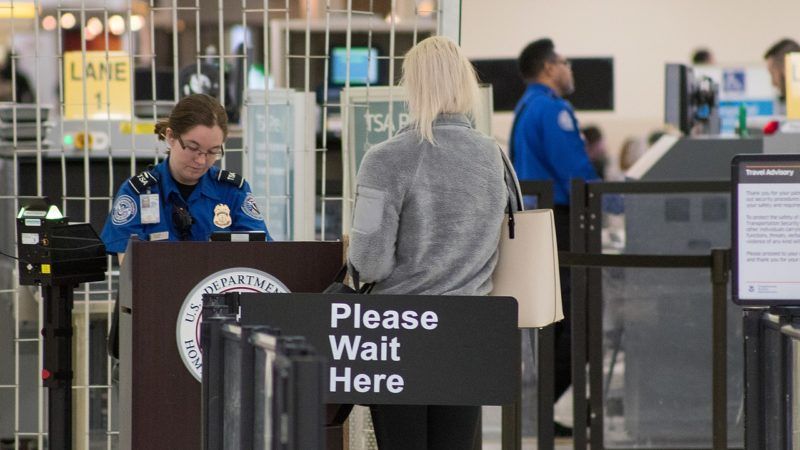The Government Says These Men Have No Recourse Against FBI Agents Who Used the 'No Fly' List To Punish Them
The Supreme Court will decide whether three Muslims who refused to be informants can sue for damages under the Religious Freedom Restoration Act.

The FBI first approached Muhammad Tanvir, a permanent U.S. resident who was born in Pakistan, in February 2007, asking him to inform on fellow Muslims in Queens. Tanvir declined, but the agents persisted for years, dangling promises, threatening him with arrest and deportation, and at one point confiscating his passport for six months.
In October 2010, Tanvir discovered that he had been added to the federal government's "no fly" list, which prevented him from visiting his family in Pakistan, forced him to quit his job as a long-haul trucker, and cost him the money he spent on airline tickets he was not allowed to use. His freedom to fly was not restored until March 2013, after he repeatedly challenged his inclusion on the list and hired a lawyer to negotiate with the FBI.
That October, Tanvir, joined by two other Muslim men who had similar experiences, initiated a case that the U.S. Supreme Court is scheduled to hear next month. They argued that the FBI violated their religious freedom when it punished them for refusing to become informants by preventing them from flying.
In 2018, the U.S. Court of Appeals for the 2nd Circuit agreed that Tanvir et al. could use the Religious Freedom Restoration Act (RFRA) to sue the FBI agents who had harassed them for monetary damages. The federal government is asking the Supreme Court to reverse that decision, arguing that RFRA authorizes only injunctive relief. Since Tanvir is no longer on the no-fly list, the government says, there is no legal remedy for the harm he suffered.
In an amicus brief filed today, the Institute for Justice highlights the broader implications of that position, which it says contradicts a long legal tradition of allowing people to recover damages when government officials violate their rights. "In the 19th century, when federal agents violated plaintiffs' constitutional rights, they could bring a damages claim," says I.J. attorney Anya Bidwell. "Unfortunately, those rights eroded over the past century. To argue that damages are not 'appropriate relief' for the violation of individual rights ignores hundreds of years of American legal history and requires the courts to create policy-based exceptions to the law, invading the constitutional role of Congress."
RFRA says the government may not "substantially burden a person's exercise of religion" unless it can show that the burden is the "least restrictive means" of serving a "compelling governmental interest." The law allows "a person whose religious exercise has been burdened in violation of this section" to "assert that violation as a claim or defense in a judicial proceeding and obtain appropriate relief against a government."
The federal government argues that monetary damages do not qualify as "appropriate relief" under RFRA. It says allowing such lawsuits would increase the burden of litigation on agencies and their employees, and it warns that the threat of damages would "deter employees from carrying out their duties" by encouraging them to "second-guess difficult but necessary decisions."
The Institute for Justice brief questions both of those claims. It notes that "federal officers sued for damages do not bear their own litigation costs," since "they are almost always represented by government attorneys." Furthermore, "the government offers no reason why the 'burdens of discovery' somehow weigh more heavily in cases for personal damages, which it argues RFRA forbids, than in cases for injunctive relief, which it admits RFRA allows." I.J. adds that "there is no foundation for the government's cries of chilled behavior," citing research indicating that the prospect of civil liability does not loom large for police officers as they carry out their duties.
More fundamentally, I.J. argues, it is not the job of the judicial branch to weigh such policy concerns:
Courts do the legal work by deciding whether the government conduct was unlawful and, if so, awarding appropriate relief; Congress does the policy work by determining whether indemnification [or immunity] is warranted….
The system advocated for by the government in this case inverts this historical practice, making courts do policy—by weighing impacts and other policy concerns that holding government officials accountable may have—and restricting the power of Congressional lawmaking by applying a presumption against enforcement of statutory prohibitions.
That inversion is inconsistent with American constitutional design and runs against more than a century of legal tradition in this country. Where there is a legal right, it is for the courts to order appropriate relief; it is for Congress to consider the policy implications and determine whether that relief should be mitigated by immunity or indemnification.
That history illuminates the intent of Congress in authorizing "appropriate relief" under RFRA, the brief argues. "By the time Congress passed RFRA in 1993, all three branches of government were in agreement that individuals could bring claims for damages against federal officials for constitutional violations," it says. "Thus, when Congress included 'appropriate relief' for violations of religious exercise under RFRA," it "understood that relief to include damages."
Although this case hinges on statutory interpretation, the deeper issue is whether government officials will be held accountable when they abuse their power. "Since the founding of this country, the role of our courts has been to decide whether a person's rights were violated and, if so, award appropriate relief, which historically includes money damages," says I.J. attorney Patrick Jaicomo. "If the Supreme Court adopts the government's position, government officials can violate the Constitution without consequence. They are effectively above the law."


Show Comments (72)